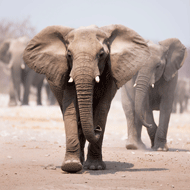
Study may aid development of better conservation strategies
Researchers in South Africa have used a scientific version of a human fitness tracker to reveal the sleeping patterns of wild elephants.
The study, published in the journal PLOS ONE, found that two matriarch elephants slept two hours a day on average. This sleep occurred in the early hours of the morning, many hours before dawn.
“The data also indicates that environmental conditions (temperature and humidity, but not sunlight) are related to when the elephants fell asleep and when they woke up (which happens well before dawn),” says co-author Prof Paul Manger from Wits University, Johannesburg.
“This finding is the first that indicates that sleep in wild animals is likely not to be related to sunrise and sunset, but that other environmental factors are more crucial to the timing of sleep.”
Working in the Chobe National Park in Botswana, the researchers made use of small activity data loggers - scientific versions of a well-known consumer fitness and wellness tracker.
They attached the devices to the elephants’ trunks - the most mobile part of an elephant - assuming that if the trunks were still for at least five minutes, the elephants were likely to be asleep. The team also installed GPS collars around their necks.
The study revealed that elephants could sleep while standing up, or while they were lying down. Lying down to sleep only occurred every three or four days and for about an hour. This can limit their ability to enter REM sleep (dreaming sleep) on a daily basis, the researchers explain.
The study also found that the two elephants, when disturbed by predators or poachers, could go without sleep for up to 48 hours. After a disturbance, the elephants would walk some 30km away from where the event occurred, putting great distance between themselves and any danger.
“Understanding how different animals sleep is important for two reasons,” Prof. Manger concludes. “First, it helps us to understand the animals themselves and discover new information that may aid the development of better management and conservation strategies.
"Second, knowing how different animals sleep and why they do so in their own particular way, helps us to understand how humans sleep, why we do, and how we might get a better night’s sleep.”



 The Veterinary Medicines Directorate (VMD) is inviting applications from veterinary students to attend a one-week extramural studies (EMS) placement in July 2026.
The Veterinary Medicines Directorate (VMD) is inviting applications from veterinary students to attend a one-week extramural studies (EMS) placement in July 2026.